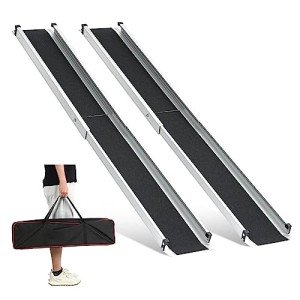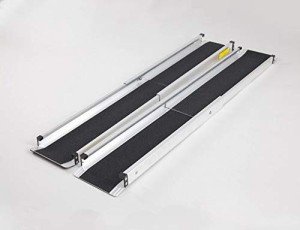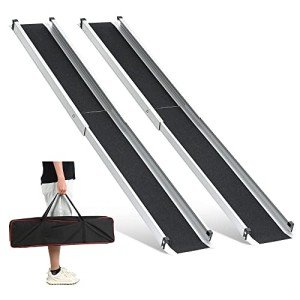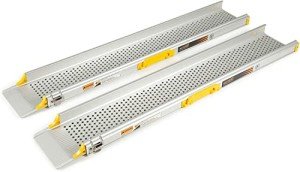As society progressively works towards becoming more inclusive, the need for mobility solutions that cater to individuals with disabilities has never been more significant. Among these essential tools, wheelchair ramps play a vital role in promoting independence. This guide explores the advantages of a 7-foot portable aluminum wheelchair ramp with a lightweight design, delving into its benefits, features, and overall utility.
Understanding the Need for Wheelchair Ramps
Wheelchair ramps are indispensable for individuals who use wheelchairs or have mobility challenges. They facilitate ease of access to homes, vehicles, and public spaces, eliminating barriers and fostering independence. While stationary ramps can be cumbersome and impractical for some users, portable ramps provide an adaptable alternative, allowing users to navigate various environments effectively.
Why Choose Aluminum?
Aluminum wheelchair ramps have gained immense popularity due to their unique properties:
- Durability: Aluminum is resistant to rust and corrosion, making it an ideal material for long-lasting ramps.
- Lightweight: Compared to other materials like steel or wood, aluminum ramps are significantly lighter, making them easy to transport and deploy.
- Stability: Despite being lightweight, aluminum ramps are designed to be sturdy and can support considerable weight without bending or breaking.
- Versatility: Portable aluminum ramps can be used in various settings, accommodating many mobility devices.
Features of a 7ft Portable Aluminum Wheelchair Ramp
A 7-foot portable aluminum wheelchair ramp features several components designed for functionality and convenience:
- Weight Capacity: Most portable ramps are engineered to support up to 800 pounds, providing ample support for users and their wheelchairs.
- Slip-Resistant Surface: To enhance safety, these ramps often come with a slip-resistant coating or texture that offers grip even in wet conditions.
- Folding Design: The ability to fold in half or into thirds allows for compact storage and effortless transportation.
- Adjustable Height: Some models provide adjustable height options, making it easier to accommodate different door thresholds or vehicle interiors.
- Carrying Handle: Many ramps are equipped with articulated handles for easy lifting and maneuvering.
Benefits of Using a Portable Aluminum Wheelchair Ramp
A 7-foot portable aluminum wheelchair ramp offers numerous advantages, making it a valuable investment for anyone needing enhanced mobility:
1. Portability
One of the most significant advantages is its portability. Users can easily transport the ramp in their car or store it away when not in use, making it ideal for those who travel frequently.
2. Ease of Use
Setting up a portable ramp is typically straightforward, requiring minimal effort. Users can quickly deploy it at home or in public spaces, promoting an independent lifestyle.
3. Enhanced Accessibility
By providing a pathway over barriers like stairs or curbs, an aluminum ramp improves access to homes, vehicles, and public facilities. This increased accessibility can significantly impact the user's quality of life.
4. Cost-Effectiveness
Portable wheelchair ramps can be a cost-effective solution compared to constructing permanent ramps, which may be more expensive and time-consuming.
5. Safety Features
In addition to the slip-resistant surface, many ramps come with safety features such as side rails to prevent accidental roll-offs and a gentle slope that adheres to ADA (Americans with Disabilities Act) standards.
6. Versatility
These ramps can be used in a variety of settings—homes, vehicles, or public places, providing multipurpose functionality to meet diverse needs.
7. Low Maintenance
Aluminum ramps require minimal maintenance compared to wooden ramps which may need regular treatments or sealants to withstand the elements.
Choosing the Right Ramp
When selecting a portable aluminum wheelchair ramp, several factors should be considered:
- Weight Capacity: Assess the total weight of the wheelchair and user to ensure the ramp can accommodate it.
- Length: The length of the ramp should be adequate to create a gentle slope for safe access. For instance, a 7-foot ramp is typically suitable for a height of up to 30 inches.
- Width: Ensure the width of the ramp can sufficiently accommodate the wheelchair.
- Portability Features: Look for ramps that are easy to fold, lightweight, and equipped with a carrying handle for enhanced convenience.
Frequently Asked Questions (FAQs)
Q1: How do I determine the right length of ramp for my needs?
The recommended slope ratio is 1:12; for every inch of rise, you need 12 inches of ramp length. For example, a 2-foot rise would require a 24-foot ramp. However, many choose a 7-foot ramp for smaller inclines or portable use.
Q2: Can I use a portable aluminum ramp outdoors?
Yes, most aluminum ramps are designed for both indoor and outdoor use. However, proper maintenance is advised to ensure they remain safe during adverse weather conditions.
Q3: How do I store a portable ramp when not in use?
Due to their lightweight and folding design, portable ramps can be easily stored in a closet, vehicle trunk, or other compact spaces.
Q4: Are there any weight restrictions for portable aluminum ramps?
Most portable aluminum ramps can safely support between 600-800 pounds, but users should always check the manufacturer's specifications.
Q5: Do I need any special tools to set up or maintain a portable ramp?
No special tools are typically needed for setup or maintenance. Ramps are designed for easy installation and can be maintained with simple cleaning tools.
A 7-foot portable aluminum wheelchair ramp offers a wealth of benefits, including enhanced mobility, ease of use, and safety features. By investing in a lightweight design, users can experience increased independence and accessibility in their daily lives. Whether at home, work, or on the go, these ramps serve as indispensable aids for individuals with mobility challenges, affirming the commitment to inclusivity and accessibility in our society.







